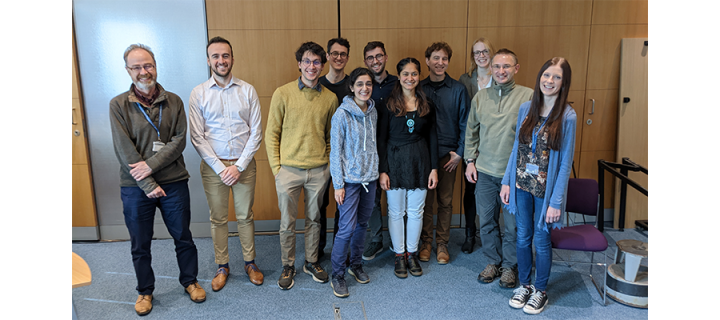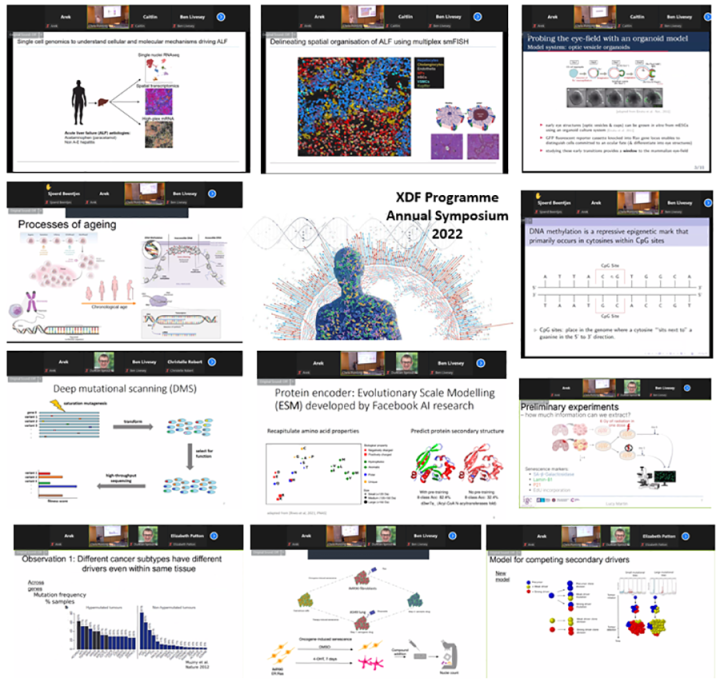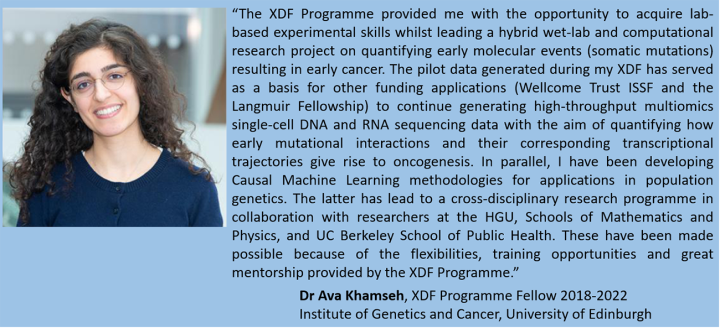XDF Programme Annual Symposium 2022
Our Institute’s Cross-Disciplinary Fellowship (XDF) Programme Annual Symposium took place on the 5th of October delivering a feast of cross-disciplinary science

In October 2022, the Institute of Genetics and Cancer (IGC) celebrated its cross-disciplinary science with the XDF Programme Annual Symposium 2022. The event, organised by Dr Arkadiusz Welman and opened by Professor Chris Ponting, took place in the Edinburgh Cancer Research seminar room. It included scientific presentations from the Programme Fellows and short talks from invited session chairs: Dr Catalina Vallejos (MRC Human Genetics Unit) and Dr Linus Schumacher (Centre for Regenerative Medicine), who reflected on their own paths to cross-disciplinarity. The Symposium was broadcasted online to enable better accessibility for people unable to travel to IGC.

Presentations by the Fellows covered the following topics:
Dr Andreas Kapourani: "Multimodal decoding of human liver regeneration"
Dr Andrew Papanastasiou: "Probing the regulation of eye-field specification using organoid multi-omics"
Dr Lyndsay Kerr: “Assessing the heterogeneity of methylation patterns within single molecules using Nanopore sequencing data”
Dr Eric Latorre Crespo: "Measuring genetic and epigenetic processes of ageing in blood"
Dr Vanessa Smer Barreto: "Senolytics and machine learning: from discovery to design"
Dr Didier Devaurs: “Making deep mutational scanning actionable for the interpretation of protein variant effects”
Dr Lucy Martin: "The role of senescence in glioblastoma radiation therapy"
Dr Michael Nicholson: "Modelling the effects of mutational processes and selection in determining cancer evolutionary trajectories"
The event attracted significant interest from across the University with visitors from the School of Informatics, many attendees in the room and online, and multiple exciting research discussions.
The XDF Symposium showcased the enthusiasm and talent of our Cross-Disciplinary Fellows. Their talks – covering ageing, liver regeneration, the earliest stages of cancer and other topics – reflected their different travels into biomedicine from a variety of starting disciplines. Some Fellows have recently, or are soon to complete their Fellowship, and XDF Directors were delighted to see them progress successfully into the next phase of their careers.
It was very satisfying to see how much the cross-disciplinary research community has grown in the Institute over the past few years contributing to multiple projects and new collaborations. It is also great to know that the XDF Programme Fellows are successful in their transition to biomedicine and that they are very positive about their XDF Programme experience.
The Cross-Disciplinary Fellowship Programme (XDF Programme; www.xdf.training) at the University of Edinburgh (UoE), which is led from the IGC in partnership with the School of Informatics (SoI), was established as one of the first programmes of its type in the United Kingdom. It is a post-doctoral level programme for physicists, computer scientists, mathematicians, statisticians, chemists, engineers and similar, seeking training to perform research integrating knowledge and methods from different disciplines, and to become leaders in Quantitative Biomedicine. The Programme was created using financial support from the Medical Research Council (as part of its funding to the MRC Institute of Genetics and Molecular Medicine, IGMM; currently IGC) with matching funds from the UoE. The scheme was subsequently expanded to accommodate additional Fellows supported by the CRUK Brain Tumour Centre of Excellence award - a CRUK funded project between UoE and the University College London.
From its very beginning the Programme was designed to span across different centres and research areas within IGC, the wider University and beyond. It was launched in 2018, with Prof Chris Ponting as the Programme Lead and Profs Margaret Frame, Jane Hillston, Tim Aitman and Guido Sanguinetti as members of the Programme Directors’ Board. Dr Arkadiusz Welman assumed the role of the Programme’s Scientific Administrator. Currently, the Directors’ Board consists of Prof Chris Ponting (lead), Prof Margaret Frame, Prof Jane Hillston, Dr Matthias Hennig and Dr Diego Oyarzún, with Dr Welman as Scientific Administrator. The Programme is supported by a large number of investigators, particularly young PIs, from UoE and other institutions, who act as XDF Fellows’ advisors and/or collaborators on diverse projects.
In addition to salary, each of the Fellows has a research/consumables budget that can be used towards their research activities and educational needs (e.g. to cover costs of participation in educational workshops etc.). To enable the best possible experience and to provide optimal learning and working environment, fellows were recruited in small cohorts, with 4 fellows recruited in 2018 [Drs A. Kapourani (computer science), A. Khamseh (particle physics), M. Marenda (physics), A. Papanastasiou (particle physics)], 3 in 2019 [Drs L. Kerr (mathematics), E. Latorre Crespo (mathematics), V. Smer Barreto (cosmology)] and 3 in 2020 [Drs D. Devaurs (computer science), L. Martin (particle physics), M. Nicholson (mathematics)]. They are guided through their transition to biomedicine by the Programme management team and dedicated project advisors, with regular “catch-up” meetings with the Directors, one-to-one meetings with the Programme Lead and other Programme-related activities. There are also specially designed XDF Programme tutorials and fellows participate-in/contribute-to a broad spectrum of scientific/educational activities within the Institute, including open access XDF Programme Annual Scientific Symposium and the Institute’s Statistical Seminar Series. Many of them help supervise students (at MSc and PhD levels) and one of the fellows, Dr A. Khamseh, was recruited to a lecturership in Biomedical Artificial Intelligence (jointly between IGC and SoI).
The XDF Programme attracted significant attention, with over 260 applications from interested candidates from across the world and two published commentaries by Prof Ponting (“Training multi-discipline scientists can fight disease”, The Scotsman, 27 August 2018; “Genetics Needs Non-geneticists”, Trends Genet. 2020,36:629-630). Most importantly, there is evidence of success and good research productivity by the Fellows with several competitively winning research grants and personal awards, appointments to editorial boards of international journals and contributions to over 20 high profile research publications. In 2022, two of the Programme Fellows, Dr Mattia Marenda and Dr Ava Khamseh, became the first XDF Programme alumni and you can read their reflections on their XDF Programme experience below.


Related Link
XDF Programme website: www.xdf.training

